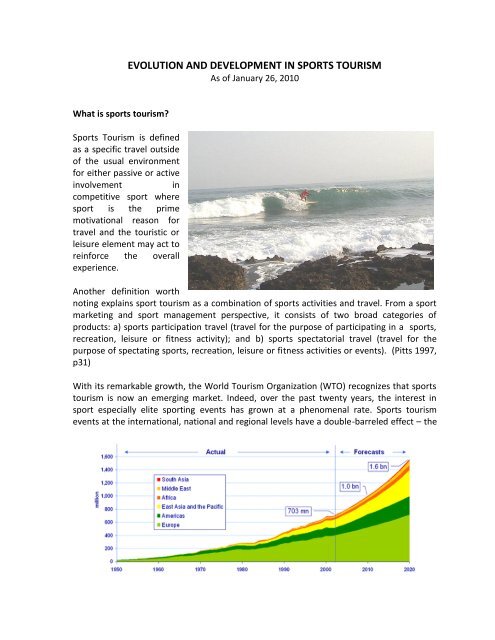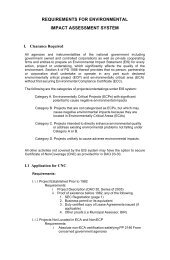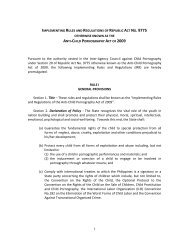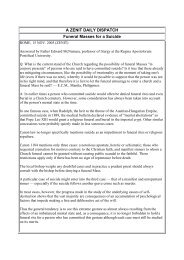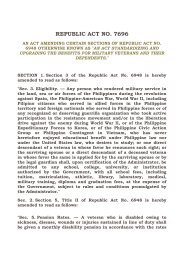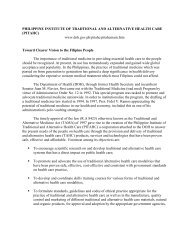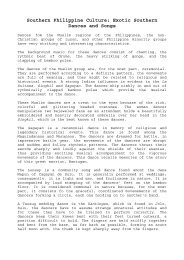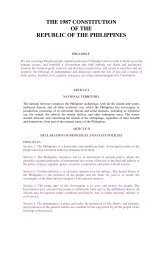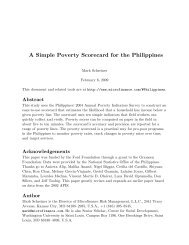evolution and development in sports tourism - It's More Fun in the ...
evolution and development in sports tourism - It's More Fun in the ...
evolution and development in sports tourism - It's More Fun in the ...
Create successful ePaper yourself
Turn your PDF publications into a flip-book with our unique Google optimized e-Paper software.
EVOLUTION AND DEVELOPMENT IN SPORTS TOURISMAs of January 26, 2010What is <strong>sports</strong> <strong>tourism</strong>?Sports Tourism is def<strong>in</strong>edas a specific travel outsideof <strong>the</strong> usual environmentfor ei<strong>the</strong>r passive or active<strong>in</strong>volvement<strong>in</strong>competitive sport wheresport is <strong>the</strong> primemotivational reason fortravel <strong>and</strong> <strong>the</strong> touristic orleisure element may act tore<strong>in</strong>force <strong>the</strong> overallexperience.Ano<strong>the</strong>r def<strong>in</strong>ition worthnot<strong>in</strong>g expla<strong>in</strong>s sport <strong>tourism</strong> as a comb<strong>in</strong>ation of <strong>sports</strong> activities <strong>and</strong> travel. From a sportmarket<strong>in</strong>g <strong>and</strong> sport management perspective, it consists of two broad categories ofproducts: a) <strong>sports</strong> participation travel (travel for <strong>the</strong> purpose of participat<strong>in</strong>g <strong>in</strong> a <strong>sports</strong>,recreation, leisure or fitness activity); <strong>and</strong> b) <strong>sports</strong> spectatorial travel (travel for <strong>the</strong>purpose of spectat<strong>in</strong>g <strong>sports</strong>, recreation, leisure or fitness activities or events). (Pitts 1997,p31)With its remarkable growth, <strong>the</strong> World Tourism Organization (WTO) recognizes that <strong>sports</strong><strong>tourism</strong> is now an emerg<strong>in</strong>g market. Indeed, over <strong>the</strong> past twenty years, <strong>the</strong> <strong>in</strong>terest <strong>in</strong>sport especially elite sport<strong>in</strong>g events has grown at a phenomenal rate. Sports <strong>tourism</strong>events at <strong>the</strong> <strong>in</strong>ternational, national <strong>and</strong> regional levels have a double-barreled effect – <strong>the</strong>
Leap for <strong>the</strong> multi-billion dollar bus<strong>in</strong>ess <strong>in</strong> <strong>sports</strong> <strong>tourism</strong>Sports Tourism is a multi-billion dollar bus<strong>in</strong>ess, one of <strong>the</strong> fastest grow<strong>in</strong>g areas of <strong>the</strong> $4.5trillion global travel <strong>and</strong> <strong>tourism</strong> <strong>in</strong>dustry. It has become a vast <strong>in</strong>ternational bus<strong>in</strong>essattract<strong>in</strong>g media coverage, <strong>in</strong>vestment, political <strong>in</strong>terest, travel<strong>in</strong>g participants <strong>and</strong>spectators.By 2011, travel <strong>and</strong> <strong>tourism</strong> is expected to be more than 10 percent of <strong>the</strong> global domesticproduct. The economies of cities, regions <strong>and</strong> even countries around <strong>the</strong> world are<strong>in</strong>creas<strong>in</strong>gly reliant on <strong>the</strong> visit<strong>in</strong>g golfer <strong>and</strong> skier or <strong>the</strong> travel<strong>in</strong>g football, rugby or cricketsupporter. In some countries, sport can account for as much as 25 percent of all <strong>tourism</strong>receipts. Thus, Sports Tourism has started to earn its reputation to be a multi-million dollarbus<strong>in</strong>ess.Trends <strong>in</strong> <strong>tourism</strong> over <strong>the</strong> last decade have shown that <strong>sports</strong> <strong>tourism</strong> is emerg<strong>in</strong>g as a verysignificant segment of <strong>the</strong> global tourist market. While <strong>tourism</strong> <strong>in</strong>dustry <strong>in</strong> <strong>the</strong> Philipp<strong>in</strong>escont<strong>in</strong>ues to grow, a significant expansion <strong>in</strong> <strong>the</strong> worldwide <strong>sports</strong> <strong>and</strong> recreation <strong>in</strong>dustryhas also been felt. These <strong>in</strong>dustries come toge<strong>the</strong>r <strong>in</strong> <strong>the</strong> <strong>sports</strong> <strong>tourism</strong> sector <strong>and</strong> with <strong>the</strong>emergence of niche markets as a major factor <strong>in</strong> <strong>tourism</strong> <strong>development</strong>, <strong>the</strong> potential forgrowth <strong>in</strong> <strong>the</strong> sector is considerable.A unison of vision of two world organizations, WTO <strong>and</strong> IOCNo less than <strong>the</strong> World TourismOrganization (WTO) <strong>and</strong> <strong>the</strong>International Olympic Committee(IOC) recognize <strong>sports</strong> <strong>and</strong> <strong>tourism</strong>as liv<strong>in</strong>g forces for mutualunderst<strong>and</strong><strong>in</strong>g, culture <strong>and</strong><strong>development</strong> of society through acooperation agreement forged <strong>in</strong>2001. Through this, it jo<strong>in</strong>tlyasserts both <strong>in</strong>dustries as<strong>in</strong>terrelated <strong>and</strong> complementary<strong>and</strong> powerful forces for<strong>development</strong>, stimulat<strong>in</strong>g<strong>in</strong>vestment, susta<strong>in</strong>able economicgrowth, <strong>and</strong> fur<strong>the</strong>r creation ofemployment <strong>and</strong> generation of revenues.
The worldwide phenomenon <strong>in</strong> <strong>sports</strong> <strong>tourism</strong>To date, <strong>sports</strong> <strong>and</strong> active recreation have become very large <strong>and</strong> successful <strong>in</strong>dustriesworldwide. A 1994 European Commission Report of <strong>the</strong> European Community <strong>and</strong> Sportestimated that <strong>sports</strong> <strong>in</strong>dustry is responsible for 2.5 percent of world trade.Over <strong>the</strong> last 10 years, <strong>the</strong> global <strong>sports</strong> <strong>in</strong>dustry has seen rapid changes <strong>and</strong> <strong>in</strong>novationsfuelled by a range of driv<strong>in</strong>g factors such as <strong>the</strong> <strong>in</strong>crease <strong>in</strong> leisure time <strong>and</strong> spend<strong>in</strong>g, <strong>the</strong>appetite for spectacle <strong>and</strong> participation, new distribution methods <strong>and</strong> <strong>the</strong> deregulation of<strong>the</strong> broadcast <strong>in</strong>dustry. This resulted to travel worldwide ma<strong>in</strong>ly for <strong>sports</strong> purposes.Sports <strong>tourism</strong> is now a multi-billion dollar bus<strong>in</strong>ess - one of <strong>the</strong> fastest grow<strong>in</strong>g areas of <strong>the</strong>$4.5 trillion global travel <strong>and</strong> <strong>tourism</strong> <strong>in</strong>dustry. By 2011, travel <strong>and</strong> <strong>tourism</strong> is expected to bemore than ten (10) percent of <strong>the</strong> global domestic product. The economies of cities, regions<strong>and</strong> even countries around <strong>the</strong> world are <strong>in</strong>creas<strong>in</strong>gly reliant on <strong>the</strong> visit<strong>in</strong>g golfer <strong>and</strong> skieror <strong>the</strong> travel<strong>in</strong>g football, rugby or cricket supporter. In some countries, sport can accountfor as much as 25 percent of all <strong>tourism</strong> receipts.An analysis by The Bureau of Tourism Research recently published <strong>in</strong> Sports Tourism: anAustralian Perspective states that 6 percent of day trips <strong>and</strong> 5 per cent of overnight tripstaken by Australians <strong>in</strong> Australia, were taken with sport as <strong>the</strong> primary motivation. Thiscorresponds to expenditure of $1847 million by domestic <strong>sports</strong> tourists, of which $461million was spent on day trips <strong>and</strong> <strong>the</strong> rema<strong>in</strong><strong>in</strong>g $1386 million on overnight trips.In a separate study <strong>in</strong> Australia, <strong>sports</strong> <strong>tourism</strong> sector accounts for about 55% of <strong>the</strong> total<strong>tourism</strong> market. Across both <strong>in</strong>ternational <strong>and</strong> domestic <strong>tourism</strong>, <strong>sports</strong> <strong>tourism</strong> <strong>in</strong> Australiaaccount for annual expenditure of about $3 billion per annum.In 1998, 37% of Canada’s 73.7 million domestic trips were for <strong>sports</strong> <strong>tourism</strong> purposes. InCanada, sport tourists are def<strong>in</strong>ed as <strong>in</strong>dividuals who traveled <strong>and</strong> <strong>in</strong> do<strong>in</strong>g so participated<strong>in</strong> or attended a <strong>sports</strong> event dur<strong>in</strong>g <strong>the</strong> reference period. Sport tourists account forbetween 2.5 <strong>and</strong> 5 million <strong>in</strong>dividuals from June to September, July <strong>and</strong> August be<strong>in</strong>g <strong>the</strong>most popular months for sport tourist activities (15% <strong>and</strong> 18%). (Statistics Canada - 1998Canadian Travel Survey) (Note that this does not mean that 37% of <strong>tourism</strong> activity was<strong>sports</strong> <strong>tourism</strong> – ra<strong>the</strong>r which 37% of travelers traveled at least once for <strong>sports</strong> purposes).While sport <strong>tourism</strong> <strong>in</strong> South Africa is yet to be established, <strong>sports</strong> <strong>tourism</strong> (spectator <strong>and</strong>participant) makes up four percent (4%) of its domestic <strong>tourism</strong> market. This appearedfollow<strong>in</strong>g <strong>the</strong> launch<strong>in</strong>g of South Africa Sports Tourism (SAST) by <strong>the</strong> M<strong>in</strong>istry ofEnvironmental Affairs <strong>and</strong> Tourism, <strong>and</strong> <strong>the</strong> M<strong>in</strong>istry of Sport <strong>and</strong> Recreation <strong>in</strong> October1997, (Swart, 1998; St<strong>and</strong>even & DeKnop, 1999) after it specifically identified <strong>sports</strong> <strong>tourism</strong>as an avenue for <strong>the</strong> <strong>development</strong> <strong>and</strong> promotion of <strong>tourism</strong> <strong>in</strong> its study.
In <strong>the</strong> case of <strong>the</strong> United States of America, <strong>the</strong> Travel Industry Association of Americafound that <strong>in</strong> <strong>the</strong> past five years, 38 percent of US adults attended an organized event,competition or tournament as a spectator or participant, while on a trip of 50 miles ormore.The British Tourist Authority <strong>and</strong> English Tourism Board claim as many as 20 percent oftourist trips are for <strong>the</strong> prime purpose of <strong>sports</strong> participation, while up to 50 percent ofholidays <strong>in</strong>clude <strong>in</strong>cidental <strong>sports</strong> participation. This level of activity is broadly consistentwith Canadian data, with <strong>the</strong> 1998 Canadian Travel Survey f<strong>in</strong>d<strong>in</strong>g that 37% of domestictrips that year were for <strong>sports</strong>-related purposes.Based on <strong>the</strong> 2005 Annual Survey of Philipp<strong>in</strong>e Bus<strong>in</strong>ess Industry (ASPBI), sport<strong>in</strong>g <strong>and</strong> o<strong>the</strong>rrecreational establishments generated <strong>the</strong> highest revenue amount<strong>in</strong>g to Php44.7 billion or45.4 % of <strong>the</strong> total revenue.The challenge to go <strong>the</strong> distance <strong>in</strong> Philipp<strong>in</strong>e <strong>sports</strong> <strong>tourism</strong> is on …No less than Hong Kong-based Action Asia declares <strong>the</strong> Philipp<strong>in</strong>es as hav<strong>in</strong>g all <strong>the</strong><strong>in</strong>gredients to become one of <strong>the</strong> world’s great adventure travel dest<strong>in</strong>ations. ThePhilipp<strong>in</strong>e l<strong>and</strong>scape is a natural haven for adventure activities <strong>and</strong> <strong>sports</strong> <strong>tourism</strong>. Our7,107 isl<strong>and</strong>s boast <strong>and</strong> offer every imag<strong>in</strong>able way for adventure seekers. Yet, <strong>the</strong> countryis still an unknown quantity outside Asia.While <strong>the</strong> country has already started to realizethat <strong>sports</strong> <strong>tourism</strong> is one ideal avenue to spur<strong>tourism</strong> growth <strong>in</strong> <strong>the</strong> country, it has not yetdone its homework of develop<strong>in</strong>g <strong>the</strong> saidsector.As an <strong>in</strong>itial step to raise awareness on <strong>the</strong>opportunities sport <strong>tourism</strong> may br<strong>in</strong>g to <strong>the</strong>country, <strong>the</strong> Philipp<strong>in</strong>e Convention <strong>and</strong> VisitorsCorporation (PCVC), supported by <strong>the</strong>Philipp<strong>in</strong>e Olympic Committee (POC) <strong>and</strong>Philipp<strong>in</strong>e Sports Commission (PSC) <strong>and</strong>participated <strong>in</strong> by <strong>the</strong> country’s <strong>sports</strong> <strong>and</strong>travel trade suppliers organized <strong>in</strong> November7-30, 2003 <strong>the</strong> 1 st Sports Tourism <strong>and</strong>Adventure Travel Show. Never<strong>the</strong>less, noconcrete plan or follow-up has been done to susta<strong>in</strong> its <strong>development</strong> ma<strong>in</strong>ly due to lack off<strong>in</strong>ancial support.
The Philipp<strong>in</strong>e Department of Tourism (DOT), which is <strong>the</strong> country’s lead agency tasked todevelop <strong>the</strong> <strong>tourism</strong> <strong>in</strong>dustry <strong>in</strong> <strong>the</strong> Philipp<strong>in</strong>es, has nei<strong>the</strong>r <strong>the</strong> policy nor operational<strong>in</strong>fluence over <strong>the</strong> policies or programs of <strong>the</strong> <strong>sports</strong> <strong>in</strong>dustry be<strong>in</strong>g adm<strong>in</strong>istered by <strong>the</strong>Philipp<strong>in</strong>e Sports Commission (PSC), much less <strong>the</strong> Philipp<strong>in</strong>e Olympic Committee (POC), anautonomous entity that sanctions <strong>the</strong> country’s participation <strong>in</strong> <strong>in</strong>ternational competitions.The Philipp<strong>in</strong>es has played host to a number of <strong>in</strong>ternational sport<strong>in</strong>g events. Sadly, <strong>sports</strong><strong>tourism</strong> opportunities, <strong>and</strong> especially <strong>the</strong> <strong>tourism</strong> benefits, are sometimes lost or notmaximized <strong>in</strong> all <strong>the</strong>se hosted events because <strong>the</strong> l<strong>in</strong>kages between <strong>the</strong> <strong>sports</strong> <strong>and</strong> <strong>tourism</strong>sectors are not yet established. Sport<strong>in</strong>g activities, especially events, have historically beenorganized by sport<strong>in</strong>g organizations for purely sport<strong>in</strong>g purposes. Maximiz<strong>in</strong>g <strong>the</strong> <strong>tourism</strong>potential of <strong>the</strong> events has often not been a major consideration for <strong>the</strong> organizers,represent<strong>in</strong>g a potential failure of <strong>the</strong> market. Fur<strong>the</strong>r, many sport<strong>in</strong>g organizations rely onvolunteers, <strong>and</strong> may not have well developed bus<strong>in</strong>ess or organizational skills orexperience. Both of <strong>the</strong>se factors can lead to lost <strong>tourism</strong> opportunities. To overcome this,better l<strong>in</strong>kages need to be established between <strong>the</strong> sport<strong>in</strong>g <strong>and</strong> <strong>tourism</strong> groups at all levels– regional <strong>and</strong> national.Senator Richard Gordon, former <strong>tourism</strong> secretary, has seen <strong>the</strong> need to streng<strong>the</strong>n thissector. In his proposed bill, SB 1834, entitled “An Act Declar<strong>in</strong>g <strong>and</strong> Implement<strong>in</strong>g a NationalPolicy for Tourism as <strong>the</strong> Primary Eng<strong>in</strong>e of Investment, Employment, Growth <strong>and</strong> NationalDevelopment, And Provid<strong>in</strong>g Necessary Incentives Therefore,” <strong>the</strong> realignment of <strong>the</strong>Philipp<strong>in</strong>e Sports Commission under <strong>the</strong> Department of Tourism is proposed. It underscores<strong>the</strong> importance of <strong>sports</strong> competition <strong>in</strong> promot<strong>in</strong>g <strong>tourism</strong>.Like many niche <strong>tourism</strong> sectors, <strong>the</strong> <strong>sports</strong> <strong>tourism</strong> sector suffers from a lack of reliabledata on which to base strategic decision-mak<strong>in</strong>g. Even data, which might help measure <strong>the</strong>size of <strong>the</strong> sector, is not readily available. The Arrival/Departure Survey Card, a research toolused by <strong>the</strong> Department of Tourism <strong>in</strong> ascerta<strong>in</strong><strong>in</strong>g arrivals <strong>and</strong> factors associated to<strong>tourism</strong> for its decision-mak<strong>in</strong>g, does not still consider <strong>sports</strong> <strong>in</strong> its checklist. Thus far, <strong>the</strong>country has no exist<strong>in</strong>g data on <strong>the</strong> extent or magnitude of <strong>the</strong> <strong>sports</strong> <strong>tourism</strong> <strong>and</strong> <strong>the</strong>economic impact it br<strong>in</strong>gs. Even <strong>the</strong> Philipp<strong>in</strong>e Sports Commission has no data on <strong>the</strong> extentof <strong>the</strong> <strong>sports</strong> <strong>in</strong>dustry, how many it employs <strong>and</strong> how much it contributes to <strong>the</strong> economy.Certa<strong>in</strong>ly, <strong>the</strong>re are still a lot of issues <strong>and</strong> impediments which need to be addressed,namely: coord<strong>in</strong>ation of <strong>the</strong> <strong>sports</strong> <strong>tourism</strong> <strong>in</strong>dustry, education <strong>and</strong> tra<strong>in</strong><strong>in</strong>g, regulatoryissues (e.g. visas, customs) on <strong>the</strong> <strong>in</strong>dustry, <strong>in</strong>frastructure requirements of <strong>the</strong> <strong>in</strong>dustry,research <strong>and</strong> data collection requirements <strong>and</strong> evaluation of <strong>the</strong> economic benefits of<strong>sports</strong> <strong>tourism</strong>.
The Philipp<strong>in</strong>es, by all means, can do so much <strong>in</strong> terms of develop<strong>in</strong>g <strong>the</strong> said market.Concrete mechanisms are yet to be <strong>in</strong>stitutionalized to maximize <strong>the</strong> <strong>sports</strong> <strong>tourism</strong> market.While o<strong>the</strong>r countries have started <strong>and</strong> <strong>in</strong> <strong>the</strong> process of develop<strong>in</strong>g strategies for <strong>the</strong>irrespective <strong>sports</strong> <strong>tourism</strong> <strong>in</strong>dustry, <strong>the</strong> country is still at a st<strong>and</strong>still <strong>in</strong> one niche marketwhere we have all <strong>the</strong> potentials to compete. After all, <strong>the</strong> <strong>tourism</strong> <strong>in</strong>dustry is more thanjust dest<strong>in</strong>ations but <strong>in</strong>novative market<strong>in</strong>g as well.Recognizes <strong>sports</strong> <strong>tourism</strong> as a catalyst for growth <strong>in</strong> <strong>the</strong> Philipp<strong>in</strong>esThe Philipp<strong>in</strong>e government, under <strong>the</strong> adm<strong>in</strong>istration of President Gloria Macapagal-Arroyo,firmly recognizes <strong>and</strong> establishes <strong>the</strong> importance of <strong>sports</strong> <strong>tourism</strong> as a catalyst for growth.On <strong>the</strong> o<strong>the</strong>r h<strong>and</strong>, <strong>sports</strong> have always been an <strong>in</strong>tegral part of <strong>the</strong> nation’s life <strong>and</strong> it is<strong>in</strong>creas<strong>in</strong>gly be<strong>in</strong>g recognized that sport<strong>in</strong>g events <strong>and</strong> activities have <strong>the</strong> potential to be amajor <strong>tourism</strong> draw card.In October 2009, President Arroyo posed a challenge to <strong>the</strong> DOT <strong>and</strong> to both <strong>the</strong> <strong>sports</strong> <strong>and</strong><strong>tourism</strong> sectors to cont<strong>in</strong>ue maximiz<strong>in</strong>g efforts <strong>and</strong> resources of an archipelagic country like<strong>the</strong> Philipp<strong>in</strong>es to go <strong>the</strong> distance. A complete message sent to <strong>the</strong> DOT is read as follows:“In 2001, <strong>the</strong> world has f<strong>in</strong>ally opened access to previously restrictedopportunities <strong>in</strong> <strong>sports</strong> <strong>and</strong> <strong>tourism</strong> when <strong>the</strong> World Health Organization(WHO) <strong>and</strong> <strong>the</strong> International Olympic Committee (IOC) hosted a major<strong>in</strong>ternational conference <strong>in</strong> Barcelona, Spa<strong>in</strong> to def<strong>in</strong>e <strong>the</strong> <strong>development</strong>issues <strong>and</strong> challenges faced by <strong>the</strong> fusion of <strong>sports</strong> <strong>and</strong> <strong>tourism</strong>.This global breakthrough has <strong>in</strong>spired <strong>the</strong> Department of Tourism to launch<strong>sports</strong> <strong>tourism</strong> <strong>in</strong> <strong>the</strong> Philipp<strong>in</strong>es <strong>in</strong> 2002. A 3-week celebration through <strong>the</strong>1 st Sports <strong>and</strong> Adventure Travel Show held at <strong>the</strong> Intramuros Clamshellsignaled <strong>the</strong> packag<strong>in</strong>g <strong>and</strong> promotion of <strong>the</strong> Philipp<strong>in</strong>es as a one-stopaction-dest<strong>in</strong>ation.Play Philipp<strong>in</strong>es!From <strong>the</strong>n on, <strong>the</strong> Department of Tourism <strong>in</strong>itiated a number of programs<strong>and</strong> activities to cater to a strong tourist dem<strong>and</strong> for <strong>sports</strong> experiences.Indeed, <strong>the</strong>re are now a high number of travelers seek<strong>in</strong>g active <strong>and</strong>passive <strong>in</strong>volvement <strong>in</strong> <strong>sports</strong>.The exp<strong>and</strong><strong>in</strong>g dem<strong>and</strong> to cater to this phenomenon is now a challengethat <strong>the</strong> Department of Tourism has to seriously consider.With <strong>the</strong> magnificent topography of Philipp<strong>in</strong>e archipelago, <strong>the</strong>re is noreason “Play Philipp<strong>in</strong>es!” will not go <strong>the</strong> distance on a global scale.”
<strong>More</strong> tasks are yet to be done <strong>in</strong> Philipp<strong>in</strong>e <strong>sports</strong> <strong>tourism</strong> <strong>development</strong>As it is, however, <strong>the</strong>re appears to be not enough effort between <strong>the</strong> <strong>sports</strong> sector/<strong>in</strong>dustry<strong>and</strong> <strong>the</strong> <strong>tourism</strong> sector/<strong>in</strong>dustry that might lead to significant <strong>development</strong> <strong>and</strong> mergenceof <strong>the</strong> <strong>sports</strong> <strong>tourism</strong> sector. For all practical purposes, significant relationship between<strong>sports</strong> <strong>and</strong> <strong>tourism</strong> is yet to be established at ei<strong>the</strong>r <strong>the</strong> policy or operational level.Impact of Sports Tourism <strong>in</strong> <strong>the</strong> Philipp<strong>in</strong>esBoth <strong>the</strong> <strong>tourism</strong> <strong>and</strong> <strong>sports</strong> <strong>in</strong>dustries have recognized <strong>sports</strong> <strong>tourism</strong> as a catalyst foreconomic <strong>and</strong> <strong>tourism</strong> growth. It can play a crucial role <strong>in</strong>:1. Mak<strong>in</strong>g known to people worldwide <strong>and</strong> nationwide that <strong>the</strong> Philipp<strong>in</strong>es have an arrayof magnificent isl<strong>and</strong>s with breathtak<strong>in</strong>g l<strong>and</strong>scapes <strong>and</strong> wonderful terra<strong>in</strong>s that are veryconducive to <strong>sports</strong>, adventure <strong>and</strong> recreational activities. That, <strong>in</strong> <strong>the</strong> Philipp<strong>in</strong>es, <strong>the</strong>y can:‣ Learn diverse k<strong>in</strong>ds of <strong>sports</strong>‣ Play <strong>and</strong> experience <strong>sports</strong> for recreation <strong>and</strong> leisure‣ Host high-level <strong>sports</strong> tournaments‣ Organize friendly games‣ Hold <strong>sports</strong> <strong>and</strong> adventure boot camps‣ Conduct <strong>sports</strong> conference <strong>and</strong> o<strong>the</strong>r educational ga<strong>the</strong>r<strong>in</strong>gs‣ Advance <strong>sports</strong> professional <strong>and</strong> academic competencies2. Persuad<strong>in</strong>g visitors to travel to a particular dest<strong>in</strong>ation;3. Stimulat<strong>in</strong>g visitation at particular times of <strong>the</strong> year;4. Encourag<strong>in</strong>g visitors to stay longer;5. Facilitat<strong>in</strong>g repeat visitation;6. Generat<strong>in</strong>g media coverage <strong>and</strong> promotional opportunities for a dest<strong>in</strong>ation; <strong>and</strong>7. Broaden<strong>in</strong>g perceptions of a dest<strong>in</strong>ation.


